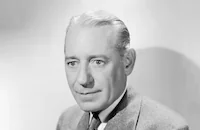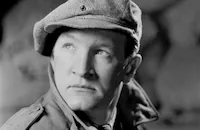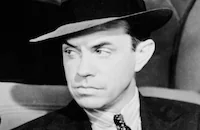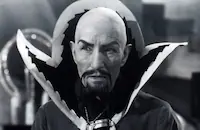Special Agent

Brief Synopsis
Cast & Crew
William Keighley
Bette Davis
George Brent
Ricardo Cortez
Jack La Rue
Henry O'neill
Film Details
Technical Specs

Synopsis
When local efforts to put gangsters in jail are ineffective, the Federal government has some success by charging criminals with evading taxes on their illegal earnings. Bill Bradford, a treasury agent posing as a newspaper reporter, is assigned to the case of gangster Alexander Carston. Bill is in love with Julie Gardner, Carston's bookkeeper. She informs him that Carston's books are kept in code and she is the only one who knows that code. After they witness the brutal murder of a man who crossed Carston, Bill begs Julie to quit her job, but she is afraid that Carston will never let her go because she knows so much. At Bill's suggestion, the district attorney pressures the murdered man's partner into testifying against Carston, but an informer reveals the plan to Carston and the witness is murdered. After a jury fails to convict Carston, Bill divulges his real identity to the district attorney, and they formulate a plan to photocopy Carston's books. For her own protection, they arrest Julie as a material witness. She decodes the books, but before she can testify, Carston has her kidnapped. Bill tricks Carston into taking him to the hideout where Julie is being held. The police follow, killing the gang and rescuing Bill and Julie. Julie's testimony sends Carston to Alcatraz, and she is free to marry Bill.

Director

William Keighley
Cast

Bette Davis

George Brent

Ricardo Cortez

Jack La Rue

Henry O'neill
Robert Strange

Joseph Crehan

J. Carroll Naish

Joseph Sawyer

William Davidson

Robert Barrat

Paul Guilfoyle
Joseph King

Irving Pichel
Jack Mchugh
Billy Naylor
Milton Kibbee
Edwin Argus

John Alexander
Jerry Fletcher
Lucille Ward
Herbert Skinner
Allan Cavan
Bob Montgomery
Huey White
Dutch Hendrian
Louis Natheaux
John Kelly
Tom Mahoney
Martha Tibbetts
Eddy Chandler
Ed Hart

Charles Middleton
Thomas E. Jackson
Pat O'malley
Douglas Wood

Lee Phelps

James Flavin
John Quillan

Wheeler Oakman
Jerry Jerome
Gene Morgan
Alan Davis
Frank G. Fanning

Emmett Vogan
Garry Owen
John Dilson
Crew

Videos
Movie Clip



Trailer
Film Details
Technical Specs

Articles
Special Agent
Davis and Brent had just made Front Page Woman (1935) together and would be teamed up by Warner Bros a total of 12 times over the next several years. Special Agent was one of their more minor efforts, and neither star was especially pleased with the way it turned out. Davis felt exasperated by what she considered lackadaisical efforts by director William Keighley and cameraman Sid Hickox. As for Brent, he told writer Ruth Waterbury of Photoplay that the picture was "a poor, paltry thing, unbelievable and unconvincing." Waterbury was surprised by Brent's frankness, for he had built up a reputation as an actor who simply did what was required of him and seldom made waves. (Around the lot, he was known as "Good Old Mr. Dependable.")
Waterbury attributed this reputation to Brent's humility. "He had had early hardship in Ireland, and a decent paycheck went a long way with George," she said. "He never thought much of his acting abilities and told me once he was afraid people would find out how lousy he was and fire him." Waterbury never published Brent's sentiments about the film because she was talked out of it by the Warner Bros publicity department.
In any event, critics liked the picture, with The New York Times calling it "crisp, fast-moving and thoroughly entertaining. It has all been done before but somehow it never seems to lose its visual excitement."
Special Agent was made just after the Hays Office started to heavily enforce the Production Code. Bits and pieces of the movie were ordered cut, resulting in some choppy continuity. The toughest scene to fix involved a line of dialogue spoken by Cortez, which was deemed especially offensive. The scene couldn't be deleted because it contained essential story information, and it couldn't be re-shot because of budgetary concerns. The solution? Erase the line from the soundtrack altogether. Cortez's silently moving lips are still in the film.
Producer: Martin Mooney, Samuel Bischoff
Director: William Keighley
Screenplay: Laird Doyle, Abem Finkel, Martin Mooney (story)
Cinematography: Sidney Hickox
Film Editing: Clarence Kolster
Art Direction: Esdras Hartley
Music: Leo F. Forbstein
Cast: Bette Davis (Julie Gardner), George Brent (Bill Bradford), Ricardo Cortez (Nick Carston), Jack LaRue (Andrews), Henry O'Neill (District Attorney Roger Quinn), Robert Strange (Armitage).
BW-76m.
by Jeremy Arnold

Special Agent
Quotes
Trivia
The Hays office objected to a bit of dialogue by character Nick Carston so rather than reshoot the scene, the sound was eliminated.
Notes
New York Times identifies story writer Martin Mooney as a New York newspaperman. It mentions further that the Hays Office required portions of the sound track to be silenced to ensure that the film contained no offensive dialogue. Modern sources confirm this claim, adding that the Hays Office requested that a scene that producer Sam Bischoff felt was crucial be cut. The studio and the censors compromised, leaving the scene intact but excising the dialogue. The MPPA/PCA Collection at the AMPAS Library does not include any correspondence relating to this subject. In the scene, Ricardo Cortez' lips move but the dialogue cannot be heard. Mooney's story was also the basis of the 1940 Warner Bros. film Gambling on the High Seas.















